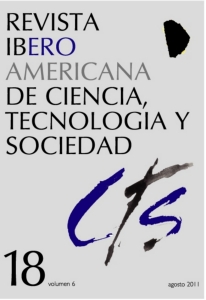O Discurso do Sistema Integrado
um estudo de caso
DOI:
https://doi.org/10.52712/issn.1850-0013-751Palavras-chave:
infraestrutura, integração, sistemas, telecomunicaçõesResumo
Investigamos, a partir de um recorte temporal que vai de 1969 até o início de 2004, a evolução dos conceitos de Sistemas Integrados de Gestão e de Gerência Integrada de Rede na Embra-tel, então a operadora brasileira de telecomunicações internacionais e de longa distância. Atra-vés de entrevistas com pessoas envolvidas nos projetos e influentes na evolução dos discursos da Integração de Sistemas, dos Sistemas Distribuídos e das Arquiteturas Padronizadas, e na produção de artefatos de TI conformes a esta visão que, como veremos, também se transforma ao longo do tempo, na medida em que avanços tecnológicos tornam possível sua realização, procuramos analisar a importância do discurso e de alguns conceitos de CTS na criação de sistemas informatizados e sua relação com a evolução da TI no país. É importante observarmos que a Embratel de que tratamos aqui não guarda relação com a empresa que existe hoje, cujo controle acionário pertence à Telmex. São outras pessoas, ou-tras estruturas organizacionais, outros valores e outras metas.
Downloads
Referências
BURGESS, M. (2004): Principles of Network and Systems Administration, Inglaterra, John Wiley & Sons Ltd.
CARVALHO, M. S. R. M. (2006): “A Trajetória da Internet no Brasil: Do Surgimento das Redes de Computadores à Instituição dos Mecanismos de Governança”, dissertação de Mestrado, COPPE-UFRJ, setembro, disponível em http://www.nethistory.info/Resources/Internet-BR-Dissertacao-Mestrado-MSaviov1.2.pdf, consulta em maio de 2011.
CARVALHO, R. F. (2010): “O surgimento das redes locais no Brasil”, XXXVI Conferência Latino-americana de Informática, CLEI / I SHIALC, Simpósio de História da Informática na América Latina e Caribe, outubro, San Lorenzo, Paraguay, Universidad Nacional de Asunción, Instituto Politécnico (org).
DANTAS, V. (1988): Guerrilha Tecnológica, a Verdadeira História da Política Nacional de Informática, Rio de Janeiro, LTC Editora, disponível em formato PDF em http://www.mci.org.br/biblioteca/guerrilha_tecnologica.pdf.
Diversos artigos e traduções de artigos clássicos sobre a Teoria Ator-Rede e assuntos correlatos (2003), disponíveis em http://www.necso.ufrj.br/.
EDWARDS, P. N. (1995): The Closed World: Computers and the Politics of Discourse in Cold War America (Inside Technology), Cambridge, MA, The MIT Press.
EDWARDS, P. N., JACKSON, S. J., BOWKER , G. C. e KNOBEL, C. P. (2007): “Understanding Infrastructure: Dynamics, Tensions and Design - Report of a Workshop on ‘History & Theory of Infrastructure: Lessons for New Scientific Cyberinfrastructures’”, NSF Office of Cyberinfrastructure, janeiro.
LAW, J. (1992): Actor Network Resource: An Annotated Bibliography, Lancaster, Grã Bretanha, Lancaster Univ., Centre for Science Studies, Department of Sociology, disponível em http://www.lancs.ac.uk/fass/centres/css/ant/antres.htm
LEAL, R. M. P. (2001): “Atraso e Modernidade no Brasil Globalizado: Uma análise do discurso da mídia na privatização das telecomunicações”, dissertação de mestrado, Escola de Comunicação, UFRJ, Rio de Janeiro.
STANTON, M. A. (1993): A Evolução das Redes Acadêmicas no Brasil: parte 1 - até 1993, publicado originalmente em inglês como “Non-commercial networking in Brazil”, San Francisco, Proceedings do Inet’93, disponível em http://www.ic.uff.br/~michael/pubs/evolucao.htm, consulta em maio de 2011.
Downloads
Publicado
Como Citar
Edição
Seção
Licença
Copyright (c) 2024 CC Attribution 4.0

Este trabalho está licenciado sob uma licença Creative Commons Attribution 4.0 International License.
Todas os números de CTS e seus artigos individuais estão sob uma licença CC-BY.
Desde 2007, a CTS proporciona acesso livre, aberto e gratuito a todos seus conteúdos, incluídos o arquivo completo da edição quadrimestral e os diversos produtos apresentados na plataforma eletrônica. Esta decisão é baseada no entendimento de que fornecer acesso livre aos materiais publicados ajuda a ter uma maior e melhor troca de conhecimentos.
Por sua vez, em se tratando da edição quadrimestral, a revista permite aos repositórios institucionais e temáticos, bem como aos sites pessoais, o autoarquivo dos artigos na versão post-print ou versão editorial, logo após da publicação da versão definitiva de cada número e sob a condição de incorporar ao autoarquivo um link direcionado à fonte original.











